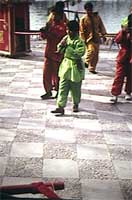|
Chinese
Family
Customs
During the long course of historical development, China's different people have
developed individual customs regarding food, clothing and housing, in response
to their own particular environments, social conditions and level of economic
development. Generally, the Han people take rice and noodles as their
staple diet (people in the south prefer rice while those in the north prefer
noodles), love to eat vegetables, beans, meat, fish and eggs, and pay particular
attention to cooking techniques. Mongolians often eat beef and mutton, and
drink tea with milk.
Tibetans take tsampa (roasted barley flour) as
their staple food, and drink buttered tea, and highland barley wine, but Tibetan
herdmen mainly eat beef and mutton. The Uygurs, Kazaks, and Ozbeks enjoy
roast mutton kebabs, unleavened bread and rice. Koreans like sticky rice
cakes, cold noodles and kimchi (spicy, pickled vegetables).
The Ling, Ji, Dai, Blang and Hani all chew betel nuts.
The
typical costume of Manchu women used to be the qipao (a close
fitting dress with high neck and slit skirt). Mongolians wear their
traditional robes and riding boots. Tibetans love to wear Tibetan robes,
waistbands and boots. Koreans are known for their boat shaped shoes.
Uygurs wear diamond-shaped embroidered skullcaps. Yi, Mao and Yao women
wear pleated shirts and are often bedecked with gold or silver ornaments.
Courtyard-type
dwellings were traditionally the rule in Han areas. Most minority herdsmen
living in Inner Mongolia, Xinjiang, Qinghai and Gansu live in yurts. The
Dais, Zhuangs and Bouyeis in southern China often live in ganlan
(multiple storied houses raised on stilts).
In
China, birthdays are not commonly celebrated, although city dwellers do so more
frequently than their country cousins, and children and old people more than you
and middle-aged people. No special ceremony is occasioned by a
birthday. Many people like to eat "longevity noodles," symbols
of long life inspired by the noodle's shape. Nowadays, many city dwellers
choose to eat Western-style birthday cakes instead of noodles.
 According
to the Marriage Law, a man may legally marry at age 22 and a woman at 20, by
acquiring a marriage license issued by a marriage registration office, thus a
wedding ceremony is not a necessary legal procedure for marriage registration,
but only a way for relatives and friends to congratulate the bride and
groom. The newlyweds will offer "wedding candies" to their
colleagues and friends. In return, their colleagues and friends will
present the newlyweds with gifts. According
to the Marriage Law, a man may legally marry at age 22 and a woman at 20, by
acquiring a marriage license issued by a marriage registration office, thus a
wedding ceremony is not a necessary legal procedure for marriage registration,
but only a way for relatives and friends to congratulate the bride and
groom. The newlyweds will offer "wedding candies" to their
colleagues and friends. In return, their colleagues and friends will
present the newlyweds with gifts.
Funeral
ceremonies in China are very simple. Usually, a memorial meeting is held
to pay last respects to the deceased and allow the living to express their
grief. Cremation is the rule in cities, and interment in rural
areas. White is the traditional color of mourning, but city people
nowadays usually wear black gauze armbands to show their bereavement.
|





 According
to the Marriage Law, a man may legally marry at age 22 and a woman at 20, by
acquiring a marriage license issued by a marriage registration office, thus a
wedding ceremony is not a necessary legal procedure for marriage registration,
but only a way for relatives and friends to congratulate the bride and
groom. The newlyweds will offer "wedding candies" to their
colleagues and friends. In return, their colleagues and friends will
present the newlyweds with gifts.
According
to the Marriage Law, a man may legally marry at age 22 and a woman at 20, by
acquiring a marriage license issued by a marriage registration office, thus a
wedding ceremony is not a necessary legal procedure for marriage registration,
but only a way for relatives and friends to congratulate the bride and
groom. The newlyweds will offer "wedding candies" to their
colleagues and friends. In return, their colleagues and friends will
present the newlyweds with gifts.


